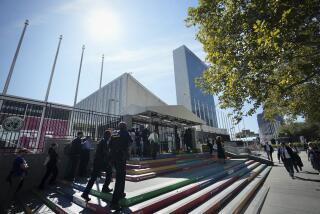Putting Somalia Back Together Again : Outsiders can do only so much; Somalis must do more
- Share via
In Somalia, the story often seems to be two steps forward and one step back.
U.N. Secretary General Boutros Boutros-Ghali took his challenge for peace directly to Somali warlords and factional leaders in informal talks in Ethiopia Monday; but all was not calm.
Inside the meetings, Somali rivals took verbal pot shots at each other. Outside were a few Somali clan leaders boycotting because some of their allies had not been invited. Yet that was not the worst of it.
Unrelated to the Somali talks, an Ethiopian student was killed while protesting the secretary general’s impending arrival in Eritrea, which is seeking independence from Ethiopia. The death illustrated the tough job that Boutros-Ghali has as he tries to negotiate peace in the world’s conflicted regions. In a span of less than a week, he faced protests in Ethiopia, Bosnia and Somalia. At one point, a barrage of rocks and garbage prevented him from entering the U.N. compound in Mogadishu.
HOPE FOR RECONCILIATION: Despite the protests, 14 representatives of Somali clans and factions are attending the informal talks sponsored by the United Nations in neighboring Ethiopia. The talks hold some promise because the fiercest rivals, including warlords Mohammed Farah Aidid and Ali Mahdi Mohamed, are among the participants. It is the largest gathering of Somali leaders since the civil war escalated two years ago.
The meetings, scheduled to end today, provide an opportunity to agree on a date, place and time for peace talks. A national reconciliation conference could take place as early as next month, according to representatives of nine Somali factions. That session could lead to the formation of the first formal government since the departure of the tyrannical dictator Mohammed Siad Barre.
The ouster of Siad Barre should have paved the way for peace and progress in Somalia. Instead, the vacuum prompted a murderous competition for control of the top job and for the spoils of government. The civil war and a crippling drought have led to the deaths of more than 350,000 Somalis.
In a lecture to the warring rivals, Ethiopian President Meles Zenawi said: “You stand now before the Somali people, the international community and history as the principal engineers of the tragedy in Somalia . . . a country that has collapsed before your eyes because of your failure to keep the family quarrel within acceptable limits.”
ABUNDANCE OF BLAME: The United Nations, which was slow to act as the Somali death toll grew, certainly shares some of the blame. As do the Organization of African Unity, the Arab League and the Organization of the Islamic Conference, which also failed to exert significant leadership as the fighting escalated. But, ultimately, most of the blame belongs to the Somali leaders, who would rather fight than share power.
Therein lies a reason for pessimism. The death count, though retarded by the presence of thousands of American soldiers, continues to mount. The U.S. Army is investigating the murder of a prominent and outspoken relief worker, Sean Devereaux of UNICEF. His body was found in a mass grave in Kismayu, prompting a pullout of all foreign workers by the international relief agency, dedicated to saving children.
That response is understandable. Relief agencies cannot be expected to sacrifice their workers, although they know that children, especially the very young, have been hit hardest by the famine and the fighting.
What will it take for Somalis to get along? The American soldiers won’t and shouldn’t stay indefinitely. The U.N. peacekeepers can only do so much. Any long-lasting solution is up to Somalis. They should get to it today at the U.N. talks in Ethiopia.
More to Read
Sign up for Essential California
The most important California stories and recommendations in your inbox every morning.
You may occasionally receive promotional content from the Los Angeles Times.













